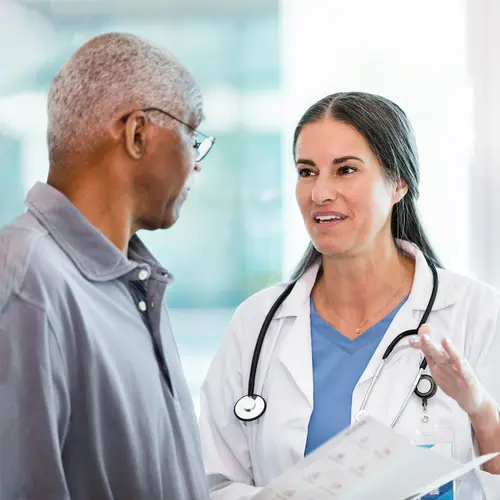When you have unresectable lung cancer -- which means surgery isn't an option -- treatments like chemotherapy, radiation, immunotherapy, and targeted therapy can slow the disease. Each of these may have side effects, but there are ways to get relief.
What to Expect During Your Treatment
Each type of lung cancer treatment has its own set of possible side effects. Some are mild and last a short a time, while others can go on for months or longer after you stop the treatment.
Radiation therapy. It uses high-energy rays to kill cancer cells. There are various types of radiation treatments. These rays can also damage healthy cells.
Radiation can cause a sunburn-like redness or blisters on your skin in the treated area. Damage from radiation to your chest can cause a cough or shortness of breath. A sore throat and trouble swallowing are side effects of radiation to the neck.
You can also get:
- Hair loss at the radiation site
- Appetite loss
- Tiredness
- Nausea and vomiting
Most of these side effects should go away when radiation treatment stops. But sometimes, breathing problems and a cough will continue months or years after your treatment ends.
Chemotherapy. It uses strong medicines to stop cancer cells from growing and dividing. These drugs can also damage healthy cells, such as blood, immune, and hair cells.
Damage to healthy cells can cause side effects like hair loss, a higher chance of infections, mouth sores, tiredness, and numbness or tingling in your hands and feet. You might also have:
- Appetite loss
- Nausea and vomiting
- Diarrhea
- Constipation
These symptoms should stop once you finish treatment.
You may get chemo and radiation together. This combination can boost the healing power of your treatment, but it could cause more side effects than either one alone.
Targeted therapies. They block proteins, genes, and other substances that lung cancer needs to grow. Because these treatments are more focused on cancer cells, they may cause less severe side effects than chemo.
Yet this treatment can still cause side effects like:
- Diarrhea
- Nausea and vomiting
- Constipation
- Mouth sores
- Rash
Immunotherapy. This gives a boost to your immune system -- the body's defense against germs -- and helps it find and kill cancer cells. During treatment, you might have side effects like fatigue, nausea, and itching.
Other possible side effects are:
- Cough
- Rash
- Appetite loss
- Constipation
- Diarrhea
Rarely, immunotherapy can trick your immune system so that it mistakenly attacks your own organs. This can lead to serious side effects involving your lungs, liver, kidneys, or other organs. In some cases, they can cause life-threatening reactions.
How to Manage Your Side Effects
Try these tips to help you handle some of the most common side effects of lung cancer treatment:
Nausea and vomiting. Take an anti-nausea medicine. You can get some over the counter, but your doctor may need to give you a prescription for others.
Also, eat several small meals during the day instead of three big ones. Avoid foods that smell strong, are greasy or spicy, or that bother your stomach.
Drink extra water and other fluids to keep your body hydrated.
Constipation. To help with this problem, eat foods that are high in fiber, such as:
- Fruits
- Vegetables
- Whole-grain breads and cereals
Drink at least 8 cups of fluids each day. And exercise for 15 to 30 minutes a day to keep your digestive system moving.
If these tips don't help, ask your doctor about over-the-counter medicines.
Diarrhea. To manage this problem, eat bland foods like the BRAT diet:
- Bananas
- Rice
- Applesauce
- Toast
Drink 8 to 12 cups of water or other clear liquids every day to make up for the fluid you lose.
Hair loss. This is a temporary problem. Your hair should start to grow back a few weeks after your treatment ends. In the meantime, be gentle when you wash or style your hair. Use a soft brush, and don't pull.
Cover your head with a hat or scarf to protect it from the sun. You can also try wigs and other head coverings to make your hair loss less obvious.
A possible treatment is scalp hypothermia. The scalp is cooled with ice packs or cooling caps before, during, and after each chemo session to try to prevent or reduce hair loss.
Mouth changes. Chemo can damage cells in your mouth. Sores, dry mouth, and taste changes are all common side effects.
While your mouth is sore, use a soft toothbrush to gently clean your teeth. Brush after every meal, and before bedtime.
Rinse your mouth with warm water before meals to wash out the bad taste. Or, suck on a lemon drop or mint.
Eat soft foods that are easy to chew and swallow. Avoid anything hot or spicy.
Sip on water during the day to keep your mouth moist. If that doesn't help, ask your doctor to recommend a saliva substitute.
Tiredness. To get your energy back, try to exercise. Even a 15-minute daily walk can help.
Nap if you need the extra rest. Just limit your sleep breaks to less than 1 hour so you can fall asleep at night.
Avoid caffeine and alcohol, which can keep you awake.
Rash and other skin changes. Both chemo and radiation can leave your skin red, itchy, and sore.
To avoid irritating your skin even more, be gentle. Use mild cleansers and creams. Wash with warm -- not hot -- water. Don't scrub your skin. After a shower or bath, pat yourself dry.
Wear sunscreen when you go outside. Protect your lips with an SPF lip balm. And cover your head and face with a wide-brimmed hat.

